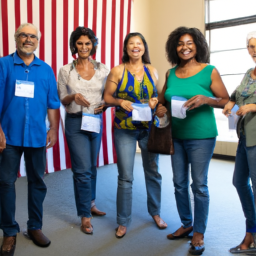Most state and federal primary elections in the U.S. are divided up by political party, and many are only open to voters who are members of that party. These closed primaries have been a long-standing practice, aiming to ensure that the party's members have a decisive say in selecting their candidates for general elections. However, closed primaries have also faced criticism for their exclusionary nature, limiting the participation of independent voters and members of third parties.
In another ironic twist, that most important of elections is not open to all Philadelphians. If you consider yourself a third-party or an independent voter, you are left out of the process. Pennsylvania excludes over a million voters from participating in its partisan primaries, something advocates hope could change this year. The exclusion of such a significant number of voters raises questions about the democratic legitimacy of primary elections and the need to reform the system.
The closed primary system has its defenders, who argue that it helps maintain party integrity and ensures that candidates truly represent the party's values and principles. Those who support closed primaries argue that members of a political party should have the final say in selecting their party's candidates. They believe that opening up the primaries to non-party members could dilute the party's ideology and lead to candidates who do not truly reflect the party's core values.
Critics, on the other hand, argue that closed primaries perpetuate a two-party system and limit the choices available to voters. They contend that the exclusion of independent voters and third-party members undermines the principles of inclusivity and democratic participation. Advocates for open primaries argue that allowing all voters to participate in primary elections would lead to a more diverse pool of candidates and foster a more representative democracy.
One particularly contentious issue surrounding closed primaries is crossover voting. The Idaho Republican Party adopted a rule intended to limit crossover voting in Republican primaries at its winter meeting. The party aims to prevent voters from participating in one party's primary to influence the selection of the opposing party's candidate. This rule is seen as a way to maintain party purity and prevent strategic voting that could undermine the party's unity.
With less than a year to go before the 2024 primary election, the push to allow "independents" to vote in Republican and Democrat primaries is gaining momentum. Advocates argue that this would lead to a more inclusive and fair electoral process, as it would allow independent voters to have a say in selecting the major party candidates.
The debate surrounding closed primaries is not limited to Pennsylvania and Idaho alone. Selecting a state from the menu below allows you to learn more about its election administration, including whether it adopts closed or open primary systems. Each state's approach to primary elections reflects the unique political dynamics and priorities of its electorate.
In conclusion, closed primaries have been a long-standing feature of the U.S. election process. While they aim to preserve party integrity, critics argue that they exclude significant numbers of voters and perpetuate a two-party dominance. As discussions about electoral reform continue, the question of whether closed primaries truly serve the interests of democracy remains a topic of intense debate.
